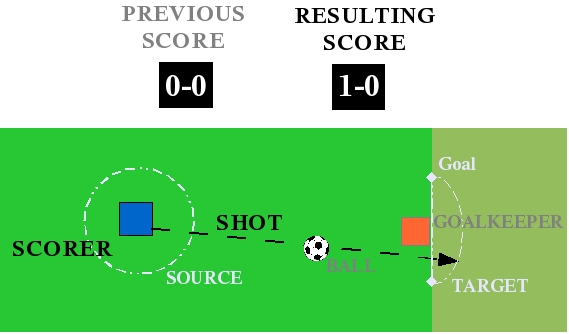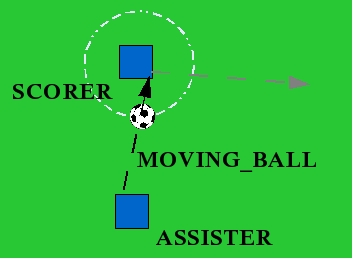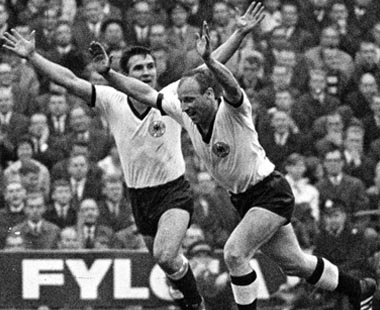Goal Scene
Frames
| A goal | Goal Overcome_Goalkeeper Concede_Goal Own_Goal |
| A goal's history | Prepare_Goal Convert_Chance |
| Awarding a goal | Award_Goal |
| Celebrating a goal | Celebrate_Goal |
| Others | Multiple_Goals Score_Goal |
| Related frames | Start_End_Match |
Description
A goal
The goal scenario is centered around the event of the ball passing over the goal line between the goalposts and under the crossbar. The main protagonist of the scenario is the scorer. The scorer scores the goal with a shot, i.e. by directing the ball from a source location on the field to a target location inside the opponent's goal, using a part of his body. In doing so, the scorer has to find a way to put the ball past the opponent's goalkeeper As a result of the goal, the previous score changes to the resulting score such that the figure designating the number of goals the scorer's team has scored is augmented by one.
The frame Goal contains LUs which describe a goal from the scorer's point of view. The frame Overcome_Goalkeeper contains LUs that construe the event primarily as a case of the scorer overcoming the opponent's goalkeeper. In LUs in the frame Concede_Goal the perspective of the team against which the goal was scored is taken. The frame Own_Goal, finally, contains LUs describing the special case in which the scorer directs the ball into his own goal, thereby effectively scoring a goal for his opponents.
A goal's history

A goal is often prepared by a team-mate of the scorer (the assister) who, by a pass or some other action, puts the scorer in a good position to attempt a shot at goal. Similarly, a moving ball which the scorer receives or a set-piece (typically a free-kick) which he carries out can be viewed as opportunities which the scorer transforms into a goal.
LUs describing the act of preparing a goal are in the frame Prepare_Goal. LUs that construe a goal as a transformed opportunity are assembled in the frame Goal_Convert_Chance.
Awarding a goal
A goal is not a goal until the referee has declared it to be so. If the referee has spotted an irregularity immediately before the goal was scored, he may decide to disallow the goal.
LUs describing these actions are assembled in the frame Award_Goal
Celebrating a goal

After a goal is scored, the scorer usually celebrates the event, possibly with one or several of his team-mates.
LUs describing these actions are assembled in the frame Celebrate_Goal
Others
There are special words describing that a particular player or a team have scored more than one goal in a game. These are contained in the frame Multiple_Goals.
Support verbs used with many nominal predicates in the Shot Scenario are assembled in the frame Score_Goal.
Related frames
Each goal is the succesful outcome of a chance to score a goal. This is documented in the frame Goal_Convert_Chance in this scenario. Other LUs related to chances are to be found in the Chance scenario.
Each goal changes the current score of the match. LUs for describing that score are to be found in the State_Of_Match scenario.
After a goal has been scored and validated by the referee, the conceding team brings the ball back into play by a kick-off. LUs describing this action are to be found in the frame Start_End_Match.